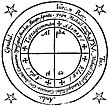
Back سحور ARY Ritualmagie German Ceremonia magio Esperanto جادوی مراسمی Persian Ceremonijalna magija Croatian Magia cerimoniale Italian Magia ceremonialna Polish Magia cerimonial Portuguese Magie ceremonială Romanian Церемониальная магия Russian

| Part of a series on |
| Magic |
|---|
 |
| Part of a series on the |
| Hermetic Order of the Golden Dawn |
|---|
 |
| Part of a series on |
| Thelema |
|---|
 |
Ceremonial magic (also known as ritual magic, high magic or learned magic)[1] encompasses a wide variety of rituals of magic. The works included are characterized by ceremony and numerous requisite accessories to aid the practitioner. It can be seen as an extension of ritual magic, and in most cases synonymous with it. Popularized by the Hermetic Order of the Golden Dawn, it draws on such schools of philosophical and occult thought as Hermetic Qabalah, Enochian magic, Thelema, and the magic of various grimoires. Ceremonial magic is part of Hermeticism and Western esotericism.
The synonym magick is an archaic spelling of 'magic'[2] used during the Renaissance, which was revived by Aleister Crowley to differentiate occult magic from stage magic. He defined it as "the Science and Art of causing Change to occur in conformity with Will",[3] including ordinary acts of will as well as ritual magic. Crowley wrote that "it is theoretically possible to cause in any object any change of which that object is capable by nature".[a] John Symonds and Kenneth Grant attach a deeper occult significance to this preference.[b]
Crowley saw magic as the essential method for a person to reach true understanding of the self and to act according to one's true will, which he saw as the reconciliation "between freewill and destiny."[4] Crowley describes this process in his Magick, Book 4.[c]
- ^ Davies (2003), p. ix.
- ^ Crowley (1997), p. xxiv.
- ^ Crowley (1973b).
- ^ Crowley (1998), p. 207.
Cite error: There are <ref group=lower-alpha> tags or {{efn}} templates on this page, but the references will not show without a {{reflist|group=lower-alpha}} template or {{notelist}} template (see the help page).
© MMXXIII Rich X Search. We shall prevail. All rights reserved. Rich X Search